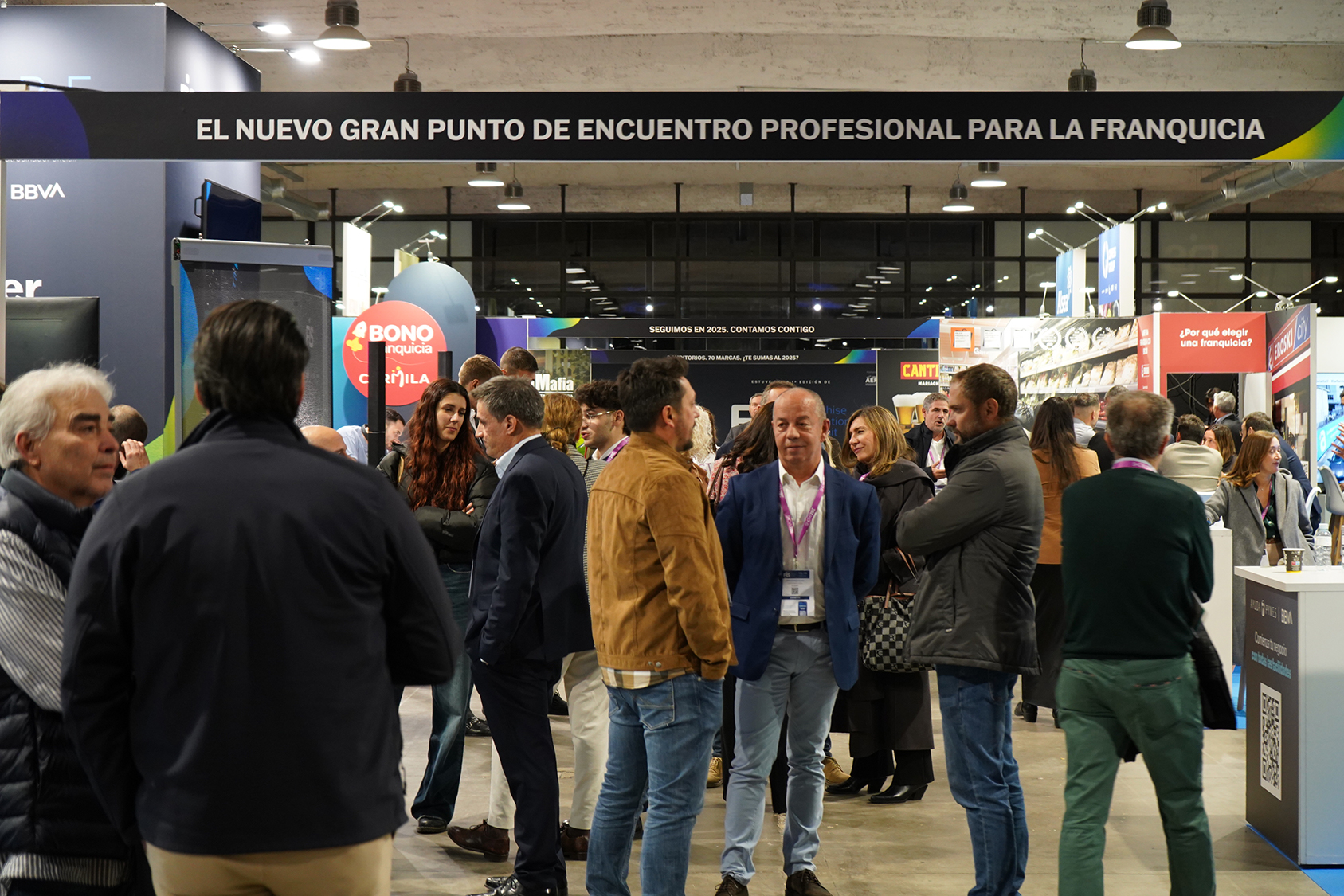Prospects and challenges of franchising in the food distribution sector: strategic opportunities in local markets

Madrid, April 10, 2025
The food retail sector in Spain is experiencing significant evolution, consolidating the franchise model as a key pillar in a market that combines resilience, innovation, and sustainability. This analysis, based on publications from Food Retail & Service (www.foodretail.es) and supported by recent data from the Spanish Franchise Association (AEF), explores the prospects and challenges of this model, highlighting its potential for investors and entrepreneurs. Brands like Dia, Eroski, Carrefour Express, Spar, Caprabo, Uvesco, Coaliment, Consum, Alcampo, Unide, Charter, Suma, BM Supermarkets , Aliprox, Alsara, Trady’s, Comarket, La Despensa Express , Proxim, Claudio, and Taste of America, among others, make up a diverse and competitive ecosystem that reflects the strength of Spanish food retail.
Outlook: a booming sector with leading brands
The franchise system in Spain is showing sustained growth, especially in the food sector. According to the AEF's Franchising in Spain 2024 Report, the sector generated a global turnover of €27.623 billion in 2023 (1.88% of GDP), an increase of 2.5% compared to the previous year. Of this total, food retail contributed €8.996 billion, representing 32.5%, and operated 78,255 establishments, 1.3% more than in 2022. Furthermore, it employed 318,313 people, an increase of 4.8%, a significant figure in a country with more than 2.5 million unemployed people. This dynamism is driven by leading and emerging brands ranging from large chains to specialized formats.
Local supermarkets are the main driver of this expansion. Dia, with 1,500 franchises, and Carrefour Express, with 1,036 points of sale (91% franchised), lead in capillarity, while Eroski, with more than 500 stores under its Eroski City brand, combines its cooperative model with a network of 1,500 stores in total. Spar, present in 48 countries and with more than 600 stores in Spain, stands out for its focus on locality and personalized service. Caprabo, with more than 50 years of history, operates mainly in Catalonia, while Uvesco, through BM Supermercados, had a turnover of €954 million in 2020, consolidating its position in the north of the country. Consum, with 928 supermarkets (374 under Charter), and Coaliment, with more than 1,100 points of sale within the HD Covalco group (including Trady's and Comarket), are reinforcing the presence of cooperative and family models.
Other brands also add value to the sector. Alcampo franchises 147 of its 257 supermarkets, Unide operates under a cooperative model with formats such as UDACO and Unide Market, and Suma, part of the Miquel group, is growing with openings such as the three new franchises announced by Transgourmet in 2025. Alsara, with stores ranging from 100 to 500 m² in southern and central Spain, and La Despensa Express, with roots in La Mancha since 1985, focus on urban and rural proximity. Simply (Alcampo), Proxim, Claudio (Gadisa), and Taste of America, specializing in American products, complete a diverse panorama that responds to the demands of convenience, quality, and specialization.
This model reduces capex for parent companies—for example, Carrefour estimates an investment of €800-1,000/m² for its Express stores—offering entrepreneurs a stable business and investors high-turnover assets. Adapting to consumer habits, such as the demand for local and organic products, further boosts its appeal.
Challenges: sustainability, profitability, and competition in a diverse market
The sector faces challenges that require specific strategies. Sustainability is a priority: Dia and Eroski lead the way with initiatives such as plastic reduction, while Caprabo and Spar implement the circular economy, and Uvesco prioritizes local suppliers. Alcampo is committed to sustainable online shopping by 2025, and Consum excels in energy efficiency. However, the AEF points out that digitalization—adopted by brands such as BM Supermarkets and Carrefour Express—and training are essential to balancing costs and profitability, especially for smaller-scale franchisees such as Alsara or La Despensa Express.
Profitability faces pressure from inflation and operating costs. Coaliment and Trady's, with no royalties or fees, offer attractive margins, while Unide and Suma optimize logistics with proprietary software. Simply and Proxim compete with low prices, but ongoing support—such as Campus Dia or Consum programs—is key for Claudio or Charter franchisees. Investors are looking for quick payback periods (less than three years), a viable approach for brands like Spar or Aliprox (Caprabo).
Competition is intense. Mercadona (25% market share), Lidl, and Aldi are investing in large, privately-owned stores, while franchises such as Carrefour Express, Eroski City, and Consum Charter differentiate themselves with personalized services and strategic locations. Taste of America and Comarket, with specific niches, and BM Supermercados, with local products, are holding their own thanks to their specialization. The choice between rural (Spar, Claudio) and urban (Carrefour Express, Suma) environments requires precise analysis to maximize returns.
Cooperatives and sustainability: a differential value
Cooperatives enrich the model. Eroski, with six million customer members and 29,806 cooperative members, Consum, with more than three million members, and Unide integrate participatory governance and sustainability. Coaliment and Charter reinforce this approach, aligning profitability with social impact, an attraction for responsible investors.
Opportunities for Investors and Entrepreneurs
The sector offers a range of possibilities. Dia, Carrefour Express, and Spar guarantee scalability, while Caprabo and Uvesco stand out regionally. Alcampo and Simply combine proximity with omnichannel, and Suma, Alsara, and La Despensa Express are betting on accessible formats. Taste of America and Proxim are exploring niches, and Claudio and Trady's are prioritizing flexibility. Digitalization (Eroski, BM) and sustainability (Consum, Coaliment) generate loyalty. The AEF projects expansion in 2025, with franchised brands growing by 4.2% in revenue in 2023 (€17.292 billion).
The Franchise Innovation Summit (FIS): the largest instrument for expanding food retail brands
The Franchise Innovation Summit (FIS), promoted by the AEF, is the most comprehensive tool for expanding food distribution brands. In 2024 (November 13-14, Madrid), it brought together 70 brands and 1,000 professionals. The 2025 edition, from October 15-16 at the Riyadh Air Metropolitano, expects to exceed 120 brands and 3,000 attendees, where the food distribution sector will have significant influence, in line with the industry's significant business volume. FIS2025 promotes innovation, sustainability, and networking, connecting entrepreneurs and investors with real opportunities in a booming sector.
In conclusion, food franchises in Spain, led by diverse and dynamic brands, offer a strategic opportunity for investors and entrepreneurs. With the support of the AEF and the FIS as a comprehensive platform, this model is poised to lead a sustainable and efficient retail industry, consolidating itself as an economic and social driver by 2025.
Raul Calleja. Franchise Innovation Summit Director






